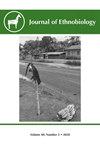改变思想的苏铁植物吗?苏克达属植物精神活性作用的初步证据
IF 1.3
3区 社会学
Q1 ANTHROPOLOGY
引用次数: 0
摘要
本文考察了苏铁作为仪式和娱乐目的的精神活动体验来源的重要性的历史和当代证据。使用的方法包括批判性分析和出版文献和灰色文献的比较,以及作者在墨西哥和南非收集的民族志账户。食用苏铁部分(花粉、珊瑚根和根茎)作为药物获得有意的精神活性作用可能涉及神经毒性氨基酸BMAA,而苏铁淀粉的发酵和蒸馏导致酒精中毒。苏铁的摄入与医学用途、魔法和宗教实践以及作为壮阳药的性刺激有关。讨论了这些功能之间的相互联系,苏铁的仪式重要性和保护意义。结论包括需要更好地了解对使用者和苏铁种群的影响,以及精神活性药物使用为社区保护提供的潜在陷阱和机会。本文章由计算机程序翻译,如有差异,请以英文原文为准。
Mind-altering Cycads? Preliminary Evidence of Psychoactive Effects in Cycadales
This article examines historical and contemporary evidence for the importance of cycads as sources of psychoactive experiences for ritual and recreational purposes. Methods used include critical analysis and comparison of published and gray literature as well as ethnographic accounts gathered by the author in Mexico and South Africa. The consumption of cycad parts (pollen, coralloid root, and caudex) to derive an intentional psychoactive effect as a drug may implicate the neurotoxic amino acid BMAA, while fermentation and distillation of cycad starch result in intoxication from alcohol. Cycad ingestion is related to medicinal uses, magico-religious practice, and sexual stimulation as an aphrodisiac. Interconnections between these functions, the ceremonial importance of cycads, and conservation implications are discussed. Conclusions include the need to better understand effects on users and on cycad populations, and the potential pitfalls and opportunities psychoactive uses present for community-based conservation.
求助全文
通过发布文献求助,成功后即可免费获取论文全文。
去求助
来源期刊

Journal of Ethnobiology
Social Sciences-Anthropology
CiteScore
4.80
自引率
3.40%
发文量
21
审稿时长
>12 weeks
期刊介绍:
JoE’s readership is as wide and diverse as ethnobiology itself, with readers spanning from both the natural and social sciences. Not surprisingly, a glance at the papers published in the Journal reveals the depth and breadth of topics, extending from studies in archaeology and the origins of agriculture, to folk classification systems, to food composition, plants, birds, mammals, fungi and everything in between.
Research areas published in JoE include but are not limited to neo- and paleo-ethnobiology, zooarchaeology, ethnobotany, ethnozoology, ethnopharmacology, ethnoecology, linguistic ethnobiology, human paleoecology, and many other related fields of study within anthropology and biology, such as taxonomy, conservation biology, ethnography, political ecology, and cognitive and cultural anthropology.
JoE does not limit itself to a single perspective, approach or discipline, but seeks to represent the full spectrum and wide diversity of the field of ethnobiology, including cognitive, symbolic, linguistic, ecological, and economic aspects of human interactions with our living world. Articles that significantly advance ethnobiological theory and/or methodology are particularly welcome, as well as studies bridging across disciplines and knowledge systems. JoE does not publish uncontextualized data such as species lists; appropriate submissions must elaborate on the ethnobiological context of findings.
 求助内容:
求助内容: 应助结果提醒方式:
应助结果提醒方式:


